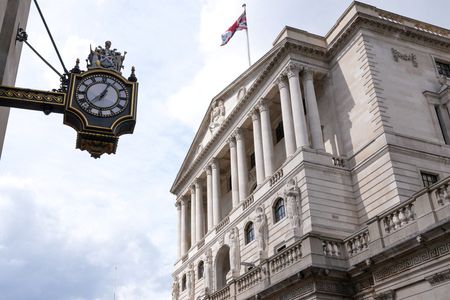By Andy Bruce
MANCHESTER, England (Reuters) – The Bank of England has signalled the tide is turning in its battle against high inflation after a series of interest rate hikes – but it has also said it is too soon declare victory.
At a news conference on Thursday, BoE officials outlined the economic indicators they will be watching most closely as they weigh up whether to raise rates again, or leave them at 4%.
Here’s how some of those gauges of Britain’s low-growth, high-inflation economy are looking:
WAGE GROWTH
Pay is perhaps the biggest concern for the BoE, with various gauges of earnings growth hitting what the central bank has called unsustainable levels if inflation is to fall back to its 2% target.
Employers’ pay award increases are on course to hit a median of 6% in January, the highest reading in over 30 years, provisional data from human resources information provider XpertHR showed on Friday.
Official wage growth data also shows record growth in private sector earnings, excluding the coronavirus pandemic period when pay was distorted by government support.
GRAPHIC: UK pay pressures still evident- https://www.reuters.com/graphics/BRITAIN-BOE/ECONOMY/znvnbkxoovl/chart.png
INFLATION EXPECTATIONS
The BoE has been heartened to see public expectations for inflation fall in recent months, meaning the prospect of a damaging wage-price spiral now looks more remote.
But policymakers stress that these expectations still remain high by historic standards.
Long-run inflation expectations, as measured by the Citi/YouGov survey, have returned within touching distance of their pre-pandemic norm of just above 3%.
GRAPHIC-UK public inflation expectations are high, but now falling- https://www.reuters.com/graphics/BRITAIN-BOE/ECONOMY/zdvxdnxegvx/chart.png
INACTIVITY
Last week the BoE downgraded its view of Britain’s potential growth rate – the rate at which the economy can grow before it starts to generate excess inflation – to just 0.7%.
This is down to the damaged supply side of Britain’s economy, reflecting a combination of the pandemic, Brexit and a failing health service that is struggling to treat people in a timely fashion – keeping many out of work.
Britain still boasts higher rates of employment and lower unemployment than most EU countries, but there are signs it has struggled more to recover. Labour force activity is still well below pre-pandemic levels, with only Italy among G7 countries faring worse on that front.
GRAPHIC-UK labour force has yet to recover from pandemic- https://www.reuters.com/graphics/BRITAIN-BOE/ECONOMY/xmvjkrbxgpr/chart.png
SERVICES INFLATION
BoE Governor Andrew Bailey said consumer price inflation – which peaked at 11.1% in October – seemed to have turned a corner. The BoE’s forecasts show inflation at 3% in a year’s time and well below target at less than 1% in two years.
The strength of inflation in services – which largely reflects domestic price pressures, unlike goods which are typically imported – is one source of unease. Members of the Monetary Policy Committee see that data as a gauge of underlying inflation in the economy.
Consumer services prices – which includes things like restaurants, hotels, transport and mobile phone contracts – rose by 6.8% in annual terms in December, their biggest increase since 1992.
GRAPHIC-UK services inflation creeps higher- https://www.reuters.com/graphics/BRITAIN-BOE/ECONOMY/lbvggbldrvq/chart.png
BUSINESS INVESTMENT
Bailey also highlighted investment and productivity – two of Britain’s weak spots – as important drivers of the outlook for inflation and the economy.
Unlike in the United States, France or Germany, business investment in Britain remains below its level in mid-2016, when the Brexit vote took place, according to a Reuters analysis of data from the Organisation of Economic Cooperation and Development.
GRAPHIC-UK business investment has fallen since the Brexit vote- https://www.reuters.com/graphics/BRITAIN-EU/ECONOMY/mopaklmkypa/chart.png
(Reporting by Andy Bruce; Editing by Catherine Evans)





